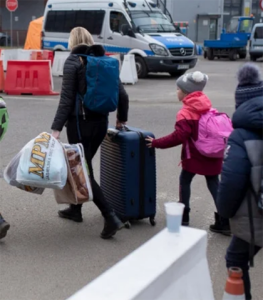Human displacement soaring in Ukraine – UN
The UN’s refugee agency UNHCR says it expects more than eight million people to flee Ukraine this year, more than double the agency’s earlier estimate as the conflict drives Europe’s worst refugee crisis since WWII.
More than 12.7 million people have fled their homes in the past two months, including 7.7 million people displaced internally and more than five million who have fled the country, the UNHCR said in a statement.
UNHCR had previously been planning for around four 4 million refugees in the immediate aftermath of Russia’s invasion of Ukraine on February 24, but this was exceeded in March.
“The scale of the crisis, definitely the rapidity of people fleeing, we have not seen in recent times,” a UNHCR statement said.
The figures mean that more than 10 per cent of Ukraine’s pre-war population of 44 million people have fled the country and around twenty per cent have been displaced within Ukraine in the two months since Russia invaded.
Women and children make up the vast majority of those fleeing the country, UNHCR said, making up around nine in every ten people.
Most have gone to Poland (2.9 million), according to UN data, though many have also fled to other nearby countries including Romania (780,000), Hungary (500,000), Moldova (440,000) and Slovakia (360,000).
Another 13 million people are estimated to be stranded in affected areas inside Ukraine or unable to leave, UNHCR said.
“The human impact and the suffering already caused by this war are staggering,” the UNHCR statement said.
“Families have been torn apart, houses and infrastructure have been destroyed and millions will feel the lasting impact and trauma of war,” it said.
UNHCR says the humanitarian crisis and mass displacement will continue to grow so long as the war continues. It says $US1.85 billion in financial support was needed so the agency and its partners can help support refugees and affected countries.
Russian forces have been accused of targeting civilians and committing war crimes during the invasion, striking cities, evacuation routes, medical facilities and schools.
Areas around Kyiv that have been retaken by Ukrainian troops, including Bucha and Irpin, have yielded evidence of executed, raped and tortured civilians, sparking global outrage.
IOM boss António Vitorino said the humanitarian crisis in Ukraine will worsen if the conflict continues.
“People continue to flee their homes because of war, and the humanitarian needs on the ground continue to soar,” Mr Vitorino said.
“Humanitarian corridors are urgently needed to allow the safe evacuation of civilians and ensure the safe transportation and delivery of much-needed humanitarian aid in order to rapidly assist those internally displaced,” he said
A survey carried out among displaced Ukrainians by IOM, the UN’s migration agency, found more than 50 per cent of displaced households have children, 57 per cent include elderly members, and 30 per cent have people with chronic illnesses.
In the first month of the war, the income of displaced households dropped sharply.
While only 13 per cent of now displaced households reported a monthly income under 5,000 Ukrainian hryvnias (US$170) prior to 24 February 2022, more than a third of displaced households say they have had no income in the last month.
Cash and financial support, transportation, food, shelter, and hygiene items are among the most pressing needs for displaced people, IOM said.
Access to medicines and health services remains the second most pressing need for both those displaced, and those staying at their places of residence, it said.
Meanwhile, Syria remains the biggest current refugee crisis in the world, with 6.8 million people having fled.












